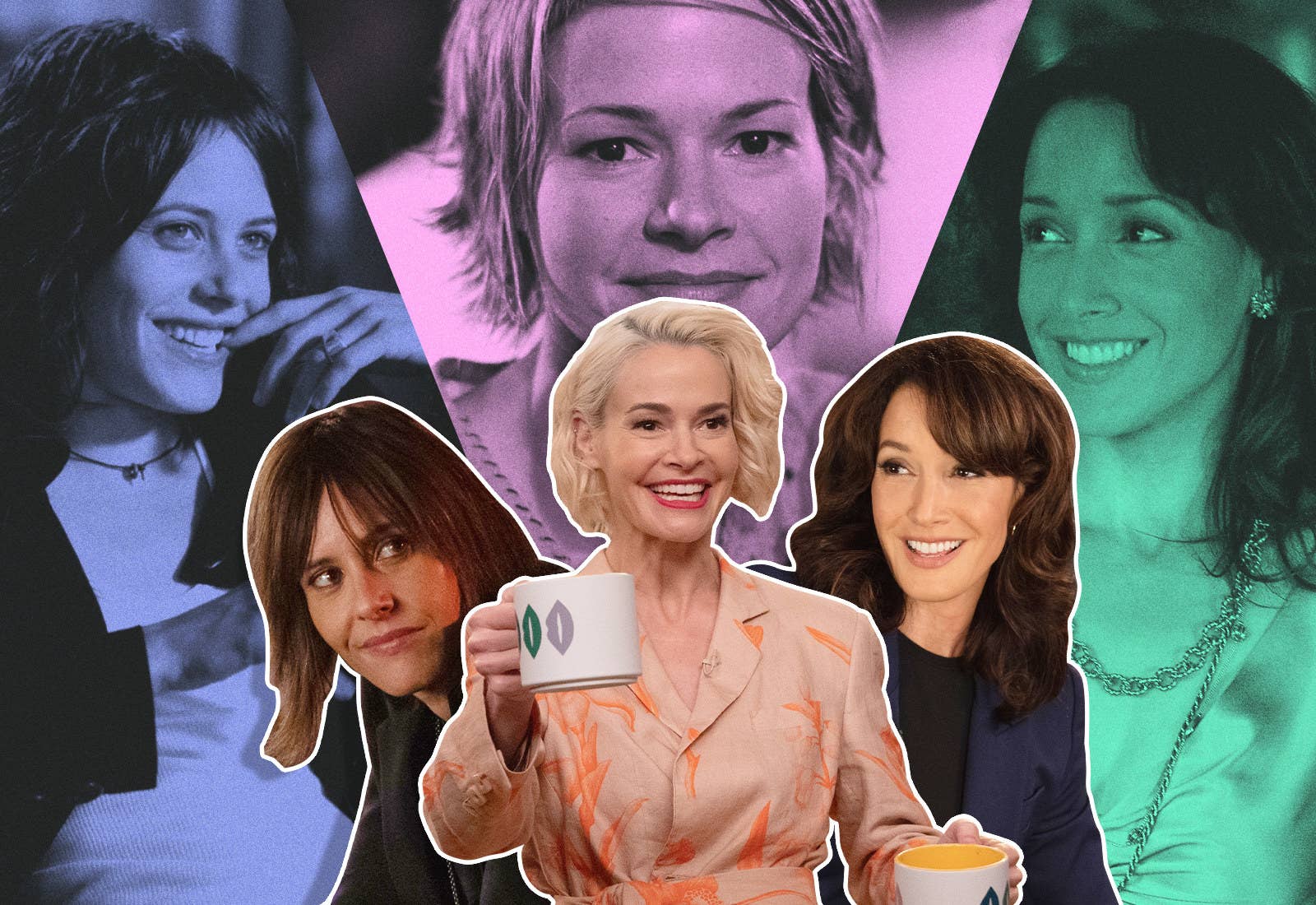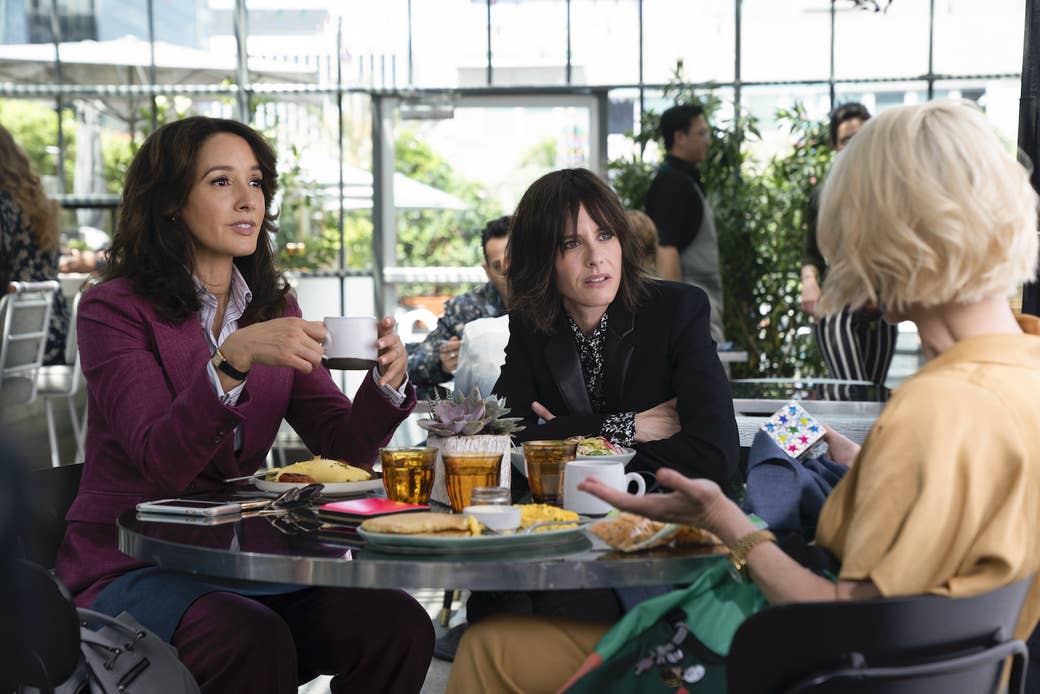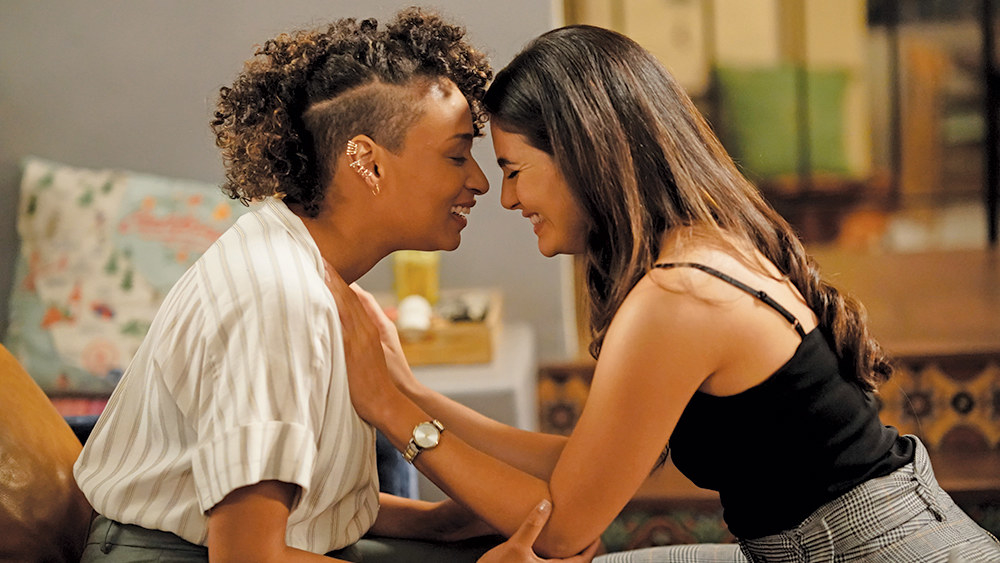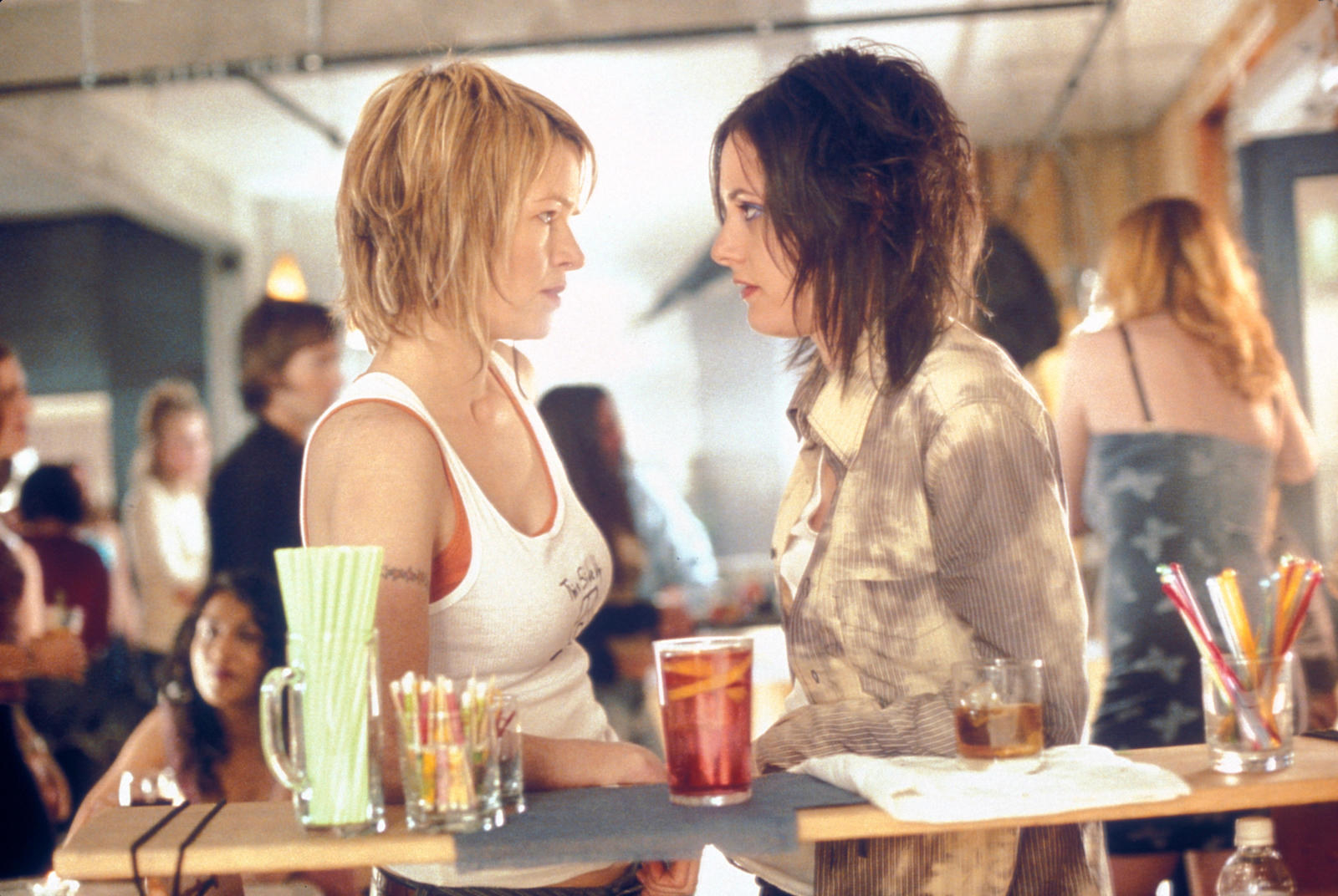
The greatest thing about The L Word, which ran from 2004 until 2009, is that it’s given queer women a common language. On first dates, at gay book clubs, when meeting new colleagues — in pretty much any situation where you, an awkward lesbian, are trying to reach across the void and connect with someone else who has lesbianism, if not awkwardness, in common — The L Word is an easy bet. Even if someone hasn’t seen it, their resistance to a cultural touchstone is just as fertile a topic for conversation. This is the only show, after all, to have ever focused so completely on lesbianism, to the extent that the world it created, made up of seemingly infinite queer women and, like, two men, was downright fantastical. Even 10 years later, there still hasn’t been a series quite like it.
According to GLAAD’s “Where We Are on TV” report for 2019, LGBTQ representation on television is at an all-time high; almost all of those characters, though, tend to be the solitary gay in an ensemble of straight people. The shows since The L Word that have included more than a single queer person plus their rotation of partners — like The Fosters, Vida, The Bisexual, Transparent, Faking It, etc. — haven’t established nearly the same significant cultural footprint. (Though some, particularly The Bisexual, deserve to!)
So it didn’t really come as a surprise when, earlier this year, Showtime announced that The L Word, with three of its main cast members, would be hitting our screens once again. L Word creator Ilene Chaiken had floated the possibility of a revival for years. “When we went off the air in 2009, I think a lot of people thought, ‘OK, the baton is passed now, and there will be lots of shows that portray lesbian life,’” she told Entertainment Weekly in 2017. “There’s really nothing. It feels like maybe it should come back.”
And why not? This would be a chance for the series to atone for some of its past sins, including its crappy attitudes toward trans and bi people, the dearth of butch characters and characters of color, and its increasingly off-the-rails plotlines. We’ll never get poor sweet Dana back (even though Chaiken regrets killing her off), but it seems one of the show’s most divisive characters could be making a what’s sure to be a bizarre comeback — if we’re to believe Mia Kirshner, who tweeted over the summer that Jenny’s not dead after all. (I, for one, would welcome it. Hers is the chaotic energy we need right now!!)
Showtime announced that the eight-episode revival, titled The L Word: Generation Q, premiering this Sunday, Dec. 8, will focus on Shane (Kate Moennig), Bette (Jennifer Beals), and Alice (Leisha Hailey), alongside a new set of “self-possessed LGBTQIA characters experiencing love, heartbreak, sex, setbacks, and success in L.A.” All my friends and I were deliriously excited (What if it’s really good?) as well as sorta afraid (But what if it’s bad? And not bad-fun, like the original was, but worse — what if it’s *boring*?)
When Showtime released the first three episodes as screeners for the press in early November, I may or may not have screamed.
Heading into the show, I wondered how, exactly, Generation Q was going to blend the old with the new. Chaiken is under an exclusive contract with Fox, so she wasn’t able to helm the project, but she’s returning to oversee things as an executive producer; Beals, Hailey, and Moennig, with whom Chaiken has remained close, are also EPs. Chaiken has stressed, however, that new showrunner and executive producer Marja-Lewis Ryan is in the driver’s seat.
Most of all, I wondered whether the new L Word characters, members of “generation Q,” would be able to attain anything like the cultural staying power of their predecessors. Whereas straight girls and gay guys may describe themselves according to Sex and the City archetypes (“I’m a Carrie sun, Miranda rising”), lesbians have our charmingly imperfect group of L Word ladies. I laughed aloud when, on The Bisexual, creator and star Desiree Akhavan’s character describes someone as a “Shane trying to be a Dana.”
Having now watched just under half of the new season, I’m as confident as ever that Bette, Shane, and Alice are truly iconic. Seeing these sexy, frustrating, ridiculous, and all-too-human characters again is truly delightful. Sadly, though, I’m worried the revival might succumb to the fate of Netflix’s Tales of the City, another modern-day remake of a queer series classic that premiered this past June. As refreshingly diverse as the new characters in both reprisals are, I don’t know if they’ll come anywhere close to icon status. Watching these various cultural LGBTQ regurgitations, I couldn’t help but wonder (sorry, the tiny bit of straight girl inside me is a Carrie): Wouldn’t it be nice if Hollywood took more risks and allowed a new generation of queer characters to explore their own universes instead?

The L Word: Generation Q starts 10 years after the original series left off. We find our three beloved original characters living even more glamorous lives than they were in 2009: Alice has spun a successful podcast into her own talk show; Shane is back in LA after amassing a mysterious fortune elsewhere; and Bette, in a brilliant move for the show, is running for mayor of the city where she’d previously conquered the art world.
We’ve relocated from West Hollywood, where the original series was based, to the eastern LA neighborhood of Silverlake, which makes sense given the tides of Los Angeles gentrification and, consequentially, the shifting locus of queer life. The changing city plays much more of a thematic role in Generation Q than it did in previous seasons, when the characters seemed to exist in an idyllic, wealthy enclave immune from the inequity and disorder of the outside world: Bette is running for mayor because she’s passionate about ending the opioid and housing crises, while Shane, aimless, unemployed, and über-rich, considers buying and reviving a onetime gay bar that has morphed over the years into a straight sports-bro spot. Bette is smartly depicted as a political progressive who struggles to live her politics on a personal level: While she advocates for public schooling, she thinks her own daughter, Angie (Jordan Hull), deserves “the best” at her fancy private school (which Angie happens to hate). She’s also at a time in her life when she’s suffering from hot flashes, which means we get to delight in Bette deadpanning to Alice that “death is coming.”
These are both fun, interesting plotlines for our OGs, though the show — somewhat annoyingly — is withholding crucial background info about both of them, like why Bette’s so passionate about opioids, and what the deal with Shane and her as-of-yet unintroduced wife (!) is. Presumably this teasing means we’re in for dramatic, devastating reveals in both departments, which, sure, bring on the melodrama; that’s what we’re all here for.
Right from the get-go, the show seems determined to convey its new progressive bona fides.
Present-day Alice also has a satisfying setup, though her blogger/journalist career, which has now landed her a TV show, still makes as little sense as it always has. More compelling is her personal life: She’s shacked up with a woman named Nat (Stephanie Allynne, who’s also great opposite Tig Notaro in One Mississippi) and Nat’s two kids from a previous marriage. This relationship does not seem destined to last, since Alice is comically inept at child-rearing; one of my favorite scenes involves Shane doing a much better job handling a kid crisis than Alice does. (Yes, I have a soft spot for mascs/andros being sweet to children; I am a femme stereotype and I accept it.)
The clunky job element of Alice’s plotline is mostly a vehicle to connect our old characters with the new (as well as feature some big, timely guest stars — I won’t spoil the first major one). Rosanny Zayas is Sophie Suarez, one of Alice’s producers, who’s dating Dani Nùñez (Arienne Mandi), a young, ambitious VP at her father’s minority-owned investment firm who, after being ripped a new one by Bette for the firm’s role in funding pharmaceuticals, has a crisis of conscience and decides to join Bette’s political campaign. Dani and Sophie live with Micah Lee (Leo Sheng), an adjunct professor. They’re good friends with a hapless production assistant on Alice’s show, played by Jacqueline Toboni, whom you may remember from her role in the lovely lesbian episodes of Netflix’s Easy. Toboni is Finley — she goes by just Finley, natch — and seems to be this generation’s answer to Shane: She’s the hot, short-haired, androgynous one with the least amount of her shit together.
Like Shane, though, Finley as well as Sophie are masculine-leaning but not really butch, meaning that the most iconic lesbian show of all time has still failed to provide us with any significant representation of a huge chunk of our community. In better news, however, Micah is an Asian American trans man, and both Sophie and Dani are women of color (Zayas, who plays Sophie, is Dominican, while Mandi, who plays Dani, is Iranian and Chilean); they’re an appropriately representative slice of both LA’s population and LGBTQ people at large. (And premiering on Dec. 8 right after The L Word: Generation Q, a new semiautobiographical Showtime show, Work in Progress, follows Abby McEnany, a self-identified fat, queer dyke from Chicago — it looks like we can get our butch representation there, at least.)

Right from the get-go, the show seems determined to convey its new progressive bona fides. The very first sex scene — which is also the first scene in general — features cunnilingus and period blood; the former was, infamously, not depicted super often in the original (just like strap-ons and sex toys). It’s an auspicious beginning, one that indicates this version of The L Word dares go to places its groundbreaking predecessor did not.
But for all that’s enjoyable, exciting, and fresh about Generation Q, I haven’t been able to get that invested in these new characters, who are all just sort of…blah. Of course, I’m only three episodes in, and they have lots of time yet to win me over; they’re also competing for our affection against old favorites who have had years’ worth of development, and who benefit from the gloss of nostalgia. But when modern, ingenious shows like The Bisexual and Fleabag have had me falling in love with their messy millennial protagonists in the matter of one or two twentysomething-minute episodes, I’m bummed that three nearly hourlong ones here haven’t sold me on the young queer people of GQ, whose generation is supposed to reflect my own. Whenever the youngs are onscreen, I feel like I’m watching a queerer version of The Bold Type awkwardly smushed into the L Word universe.
Whenever the youngs are onscreen, I feel like I’m watching a queerer version of The Bold Type awkwardly smushed into the L Word universe.
I get Bold Type vibes especially from Dani, Bette’s prototype, who’s somewhat unpleasantly girlbossy, though she does wear fabulous high-waisted pantsuits. (One of the great things about Generation Q is seeing the new characters as well as the originals in actually stylish clothing — a far cry from the fashion nightmare that was the aughts. Who can forget Shane’s absurd vests?) Dani’s relationship with Sophie, who gets upset when Dani takes the job working for Bette without telling her because she thought they were going to “settle down,” doesn’t feel particularly believable. The issue is perhaps that both characters, like the rest of the new generation, lack specificity. Dani: a striver, torn between her conscience and her desire to please her wealthy dad. Sophie: annoyed at Dani’s desire to please her wealthy dad; has an extremely cool haircut; close with her family; makes some jokes sometimes? In the first episode, when Dani proposes, I cringed at her When Harry Met Sally–esque attempt at an “I love you for x, y, z random things” (“I love the way you talk to the TV… I love that you dance with your eyes closed…”). Later, watching an awkward scene with Ferris Bueller vibes, I wondered if these references were actually supposed to be homages or if they were just lazy.
Micah has promise, but he’s still rather one-dimensional: nice, shy, gay, looking for love, and perhaps, on the whole, too defined by his transness or, rather, by his reluctance to talk about it. Finley, meanwhile, who drinks too much, calls herself “a kinda traditional lesbian” because she’s good with tools, and doesn’t do a great job at either work or dating, is endearingly goofy, but also borderline annoying — that she’s randomly squatting in one of Shane’s empty rooms in a forced attempt to get the two characters to interact isn’t helping matters. She’s been excommunicated by her religious family, and her first love interest promises a plotline devoted to excavating her troubled Catholic past.
What I’m hoping for from the rest of the season are the kinds of conversations about, and insights into, queer culture today that take after the way the original show, however imperfectly, explored lesbian identity and community: how we identify one another in the wild, stereotypes about our tendencies to fall in love too quickly, historic gathering spots like Olivia cruises and the Dinah Shore. One of the things that made The L Word so great, despite its many failings, was that the characters weren’t just incidentally gay, like so many characters on television today; they considered lesbianism to be an important part of their identities and their culture. What might these middle-aged lesbians have to teach a younger generation, and what might the younger generation teach them in return?

The problem with taking on those sorts of tricky political or social topics, however, is that it’s all too easy for a show to avoid specificity and complexity — how messy this stuff can be — in favor of a kind of kumbaya earnestness. That’s what happened to Tales of the City, the 2019 Netflix sequel to the ’90s Channel 4 miniseries (which was itself an adaptation of Armistead Maupin’s beloved novels, first published in 1978, about gay and gay-adjacent life in San Francisco).
We’re living in the age of never-ending sequels, when studios are increasingly afraid to take bets on new material and instead milk existing and previously successful intellectual properties for all they’re worth. LGBTQ shows are no exception; we’ve seen the return of Will & Grace, Queer Eye for the Straight Guy, and now The L Word; soon Queer as Folk is coming back too. Tales of the City, released in a 10-part miniseries over the summer, was another queer show dusted off from the archives and reimagined with a more progressive vision in mind.
The series sees Mary Ann (Laura Linney reprising her role) return decades after the original series ended to her former home at Barbary Lane, where Anna (Olympia Dukakis), now 90, is still smoking plenty of pot and playing benevolent landlady to an eccentric group of San Franciscans. Now, the Barbary Lane tenants include a more diverse assemblage of queer and trans people. Some of the new additions have poignant, timely arcs — a young lesbian who’s struggling with her partner’s transition, and that partner’s newfound attraction to men — but too many others feel slapdash and awkward, like a set of extremely annoying influencer-wannabe twins who seem like the products of a millennial-hating boomer lab. The villain of the season’s blackmail subplot seems to have been cooked up in that same lab: a creative millennial desperate to be liked. And any attempts to tackle intergenerational issues, or reference the crush of San Francisco gentrification, end up swallowed in the show’s well-meaning but painfully corny desire to depict Barbary Lane as some untouchable queer utopia. Tales of the City tries to do too much, with too many characters, all of whom seem more like dutifully included LGBTQ archetypes — items checked off a diversity list — than fully rendered people.
We’re living in the age of never-ending sequels, when studios are increasingly afraid to take bets on new material and instead milk existing and previously successful intellectual properties for all they’re worth.
I’m worried that Generation Q is trying to do something similar by forcing these new characters into an existing property, in effect smushing a peppy, millennial workforce sitcom together with a sexy, soapy cable dramedy. Ilene Chaiken herself is wary of the industry’s tendency to reboot old LGBTQ shows rather than producing new ones. “As a rule I don’t love remakes and reboots,” she told the Cut. “As a writer, I feel like we’ve got lots of stories to tell and we don’t need to constantly repeat ourselves. We rail all the time about our business and the fact that nobody’s doing anything original anymore, and I don’t need to see another remake of this or that. That said, there aren’t a lot of gay shows being told, still.”
Did we really need another gay reboot? I think the answer will depend on whether it’s really possible for us to fall in love with characters that seem rather cynically designed to coast on the fumes of goodwill inspired by a wholly original show. I felt the least charitable about the new series’ fume-coasting when, multiple times throughout these first three episodes, the new generation of characters spontaneously pulled each other up from their seats and started to dance. I thought immediately of “Lookin’ at You, Kid,” one of my favorite episodes ever of the original L Word run. Dawn Denbo (Elizabeth Keener), one of the show’s most ridiculous secondary characters, crashes the Lez Girls party to confront Shane for having defiled “my lover Cindy.” Shane, Alice, and Tina (Laurel Holloman), who’ve been dancing joyfully on the kitchen table to the Jackson 5, are all stoned on pot brownies. So when Dawn starts yelling at Shane, the group of friends can only pause, momentarily uncomprehending, then burst out laughing like the sky-high hooligans they are.
When I first watched the series as a college student, semi-closeted and working up the courage to break up with my long-term boyfriend (because of the whole gay thing), it wasn’t so much the spectacularly volatile lesbian romances on L Word that pulled on my heartstrings — it was the friendships. Five seasons’ worth of investment in the dynamics of this friend group kept paying off in such joyful and genuine-feeling moments. Perhaps, with time, Generation Q will feel less like an opportunity to cash in on something long beloved and more like a real, successful effort to say something new. ●
